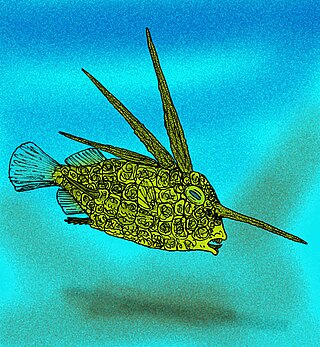
Eospinus daniltshenkoi is an extinct tetraodontid bony fish from the Eocene. Its fossils are from the Danata Formation lagerstatten of Ypresian Turkmenistan.
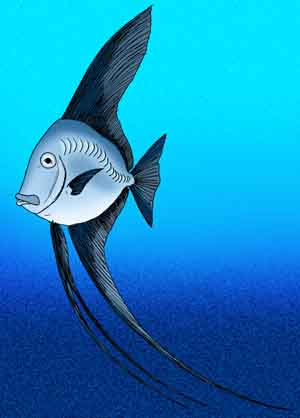
Ceratoichthys pinnatiformis is an extinct species of lookdown-like prehistoric jackfish that lived during the Lutetian epoch, of the Middle Eocene of Monte Bolca, Italy.

Proaracana dubia is an extinct, prehistoric aracanid boxfish that lived during the Lutetian of middle Eocene Monte Bolca.

Spinacanthus cuneiformis is an extinct prehistoric tetraodontid bony fish that lived from the Lutetian epoch of Eocene Monte Bolca.
Paranguilla tigrina is an extinct prehistoric eel that lived during the Lutetian epoch of the Eocene, in what is now Monte Bolca.

Bolcyrus is an extinct genus of prehistoric bony fish that lived from the early to middle Eocene.
Rhamphexocoetus volans is an extinct bony fish that lived during the Lutetian epoch of Monte Bolca. It combines features of both halfbeaks, and flying fishes.

Ductor is an extinct genus of prehistoric ray-finned fish that lived from the early to middle Eocene. Fossils are found in Monte Bolca.
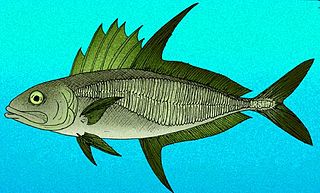
Eastmanalepes primaevus is an extinct species of prehistoric jack fish that lived from the Lutetian epoch, of what is now Monte Bolca, Italy. It was originally described as a species of the jackfish genus Caranx, of which it has a superficially similar outline to. It differs from Caranx, and almost all other jackfish, in that it has very large, very pronounced scutes along its lateral line. According to Bannikov, E. primaevus is probably more related to the extinct jackfish genera, Eothynnus and Teratichthys.

Eolactoria sorbinii is an extinct prehistoric boxfish that lived during the Lutetian epoch of the middle Eocene, in Monte Bolca. It had two pairs of long spines, one over each eye, and one pair beneath the anal and caudal fins, arranged very similarly to those possessed by the modern genus Lactoria, but were, in comparison, much longer. E. sorbinii had a fifth spine between the two eye-spines, arranged and looking very much like a nose.
Archaephippus is an extinct genus of prehistoric spadefish that lived from the early to middle Eocene. Several exquisitely preserved fossils have been found from the Monte Bolca lagerstatten.
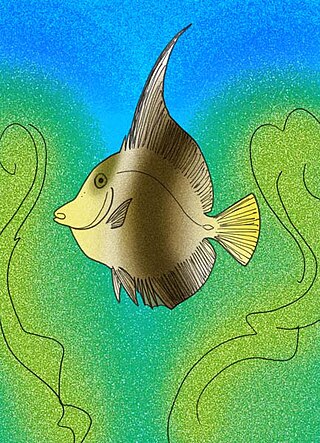
Eozanclus brevirostris is an extinct relative of the Moorish idol that lived during the late Ypresian epoch of the Eocene in what is now Monte Bolca, northern Italy. It differs from its living relative by having a much shorter snout.
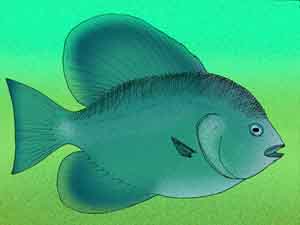
Psettopsis subarcuatus is an extinct, prehistoric moonyfish that lived during the Lutetian epoch of Monte Bolca, Italy.

Tylerichthys is an extinct genus of prehistoric surgeonfish that lived in a coral reef during the Lutetian epoch of what is now Monte Bolca, Italy.
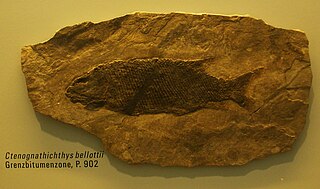
Ctenognathichthys is an extinct genus of prehistoric bony fish that lived during the early Ladinian stage of the Middle Triassic epoch. It was a small fish measuring 21 cm (8.3 in) long.
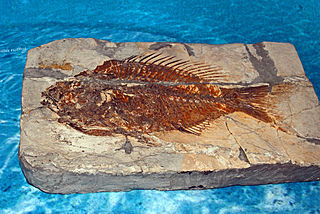
Sparnodus is an extinct genus of prehistoric perciform fish in the family Sparidae. Species of this genus were nektonic carnivore. These fishes lived in the Cenozoic Era, in Oligocene and Paleocene.
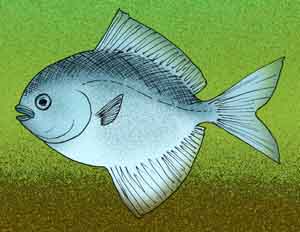
Pasaichthys pleuronectiformis is an extinct, prehistoric moonyfish that lived during the Lutetian epoch of Monte Bolca, Italy. The average length of its fossils is about 6 centimeters. In life, it would probably resemble its living relatives of the genus Monodactylus.

Protobalistum imperiale is an extinct prehistoric tetraodontid bony fish that lived from the Lutetian epoch of Eocene Monte Bolca.

Spinacanthidae is an extinct prehistoric family of tetraodontid bony fish that lived from the Lutetian epoch of Eocene Monte Bolca.

Cyclopoma is an extinct genus of perch-like fishes belonging to the family Serranidae.

















